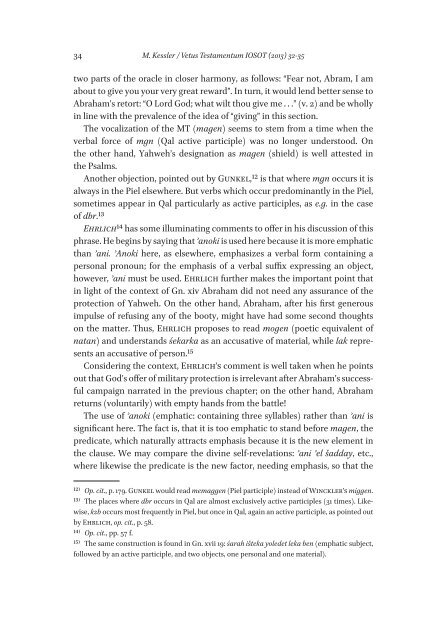Special Issue IOSOT 2013 - Books and Journals
Special Issue IOSOT 2013 - Books and Journals
Special Issue IOSOT 2013 - Books and Journals
Create successful ePaper yourself
Turn your PDF publications into a flip-book with our unique Google optimized e-Paper software.
34 M. Kessler / Vetus Testamentum <strong>IOSOT</strong> (<strong>2013</strong>) 32-35<br />
two parts of the oracle in closer harmony, as follows: “Fear not, Abram, I am<br />
about to give you your very great reward”. In turn, it would lend better sense to<br />
Abraham’s retort: “O Lord God; what wilt thou give me . . .” (v. 2) <strong>and</strong> be wholly<br />
in line with the prevalence of the idea of “giving” in this section.<br />
The vocalization of the MT (magen) seems to stem from a time when the<br />
verbal force of mgn (Qal active participle) was no longer understood. On<br />
the other h<strong>and</strong>, Yahweh’s designation as magen (shield) is well attested in<br />
the Psalms.<br />
Another objection, pointed out by Gunkel,12 is that where mgn occurs it is<br />
always in the Piel elsewhere. But verbs which occur predominantly in the Piel,<br />
sometimes appear in Qal particularly as active participles, as e.g. in the case<br />
of dbr.13<br />
Ehrlich14 has some illuminating comments to offer in his discussion of this<br />
phrase. He begins by saying that ʾanoki is used here because it is more emphatic<br />
than ʾani. ʾAnoki here, as elsewhere, emphasizes a verbal form containing a<br />
personal pronoun; for the emphasis of a verbal suffix expressing an object,<br />
however, ʾani must be used. Ehrlich further makes the important point that<br />
in light of the context of Gn. xiv Abraham did not need any assurance of the<br />
protection of Yahweh. On the other h<strong>and</strong>, Abraham, after his first generous<br />
impulse of refusing any of the booty, might have had some second thoughts<br />
on the matter. Thus, Ehrlich proposes to read mogen (poetic equivalent of<br />
natan) <strong>and</strong> underst<strong>and</strong>s śekarka as an accusative of material, while lak represents<br />
an accusative of person.15<br />
Considering the context, Ehrlich’s comment is well taken when he points<br />
out that God’s offer of military protection is irrelevant after Abraham’s successful<br />
campaign narrated in the previous chapter; on the other h<strong>and</strong>, Abraham<br />
returns (voluntarily) with empty h<strong>and</strong>s from the battle!<br />
The use of ʾanoki (emphatic: containing three syllables) rather than ʾani is<br />
significant here. The fact is, that it is too emphatic to st<strong>and</strong> before magen, the<br />
predicate, which naturally attracts emphasis because it is the new element in<br />
the clause. We may compare the divine self-revelations: ʾani ʾel šadday, etc.,<br />
where likewise the predicate is the new factor, needing emphasis, so that the<br />
12) Op. cit., p. 179. Gunkel would read memaggen (Piel participle) instead of Winckler’s miggen.<br />
13) The places where dbr occurs in Qal are almost exclusively active participles (31 times). Likewise,<br />
kzb occurs most frequently in Piel, but once in Qal, again an active participle, as pointed out<br />
by Ehrlich, op. cit., p. 58.<br />
14) Op. cit., pp. 57 f.<br />
15) The same construction is found in Gn. xvii 19: śarah išteka yoledet leka ben (emphatic subject,<br />
followed by an active participle, <strong>and</strong> two objects, one personal <strong>and</strong> one material).








![Am HaSefer [Volk des Buches] - Books and Journals](https://img.yumpu.com/20648352/1/174x260/am-hasefer-volk-des-buches-books-and-journals.jpg?quality=85)







